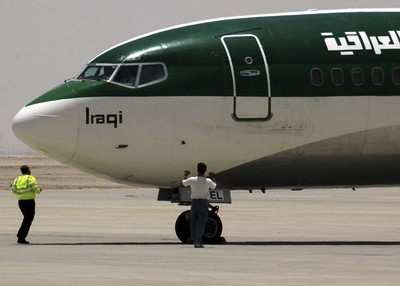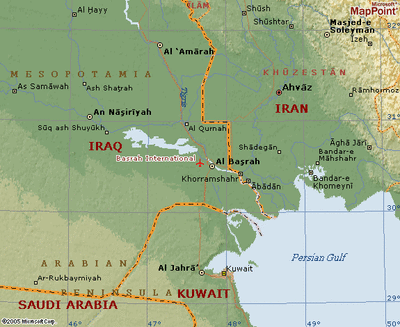After almost 20 years of sporadic flying and finally being
grounded, the first Iraqi Airways flight landed at Basrah
International Airport June 4 with the help of the U.S. Army Corps
of Engineers Gulf Region South.

The Corps' goal is to give the Iraqis a functioning civil
aviation airport that will allow planes with passengers to land and
take off, both domestically and internationally, according to
Robert Vanoer, resident engineer for the Basrah Resident Office,
Gulf Region District South (GRS).
"The details the Corps is involved in are critical to the
airport," said Vanoer. "The big piece is to ensure the terminal has
air conditioning. Another big piece is the air control tower, which
is 12 stories high and has no elevator. The British Army uses it
for their physical training. There are other things that are in the
works, such as the rehabilitation of the water treatment plant,
which is critical to the chillers (air conditioning)."
The chillers need processed water, which is ultra clean, to run
smoothly, according to Dan Drew, Project and Contracting Office
(PCO) project manager for the airport project.
"These chillers weigh 1700 tons," said Drew, "and they feed a
chilled water system in underground tunnels through the whole
airport. One of the reasons they failed is because the water from
the water treatment plant had scale in it - metallic particles -
that ended up settling and clogging a lot of tubes and small
orifices in the chiller units."

Drew said the water is also needed for fire protection, and that
this water comes from a reservoir from the water treatment plant.
Originally built in 1986, the plant, like many of the airport's
facilities was never maintained and now needs refurbishment. "The
airport was like a small city - self contained," he said. "So when
one component failed, a lot of the systems were affected."
The next project, the second largest at the airport, involves
the installation of Navigational and Visual Aids, according to
Drew. The Navigational Aids contract, $28 million, was awarded to
Raytheon and negotiations are continuing. The airport's radar
equipment falls under this contract and the airport cannot receive
International Civil Aviation Organization certification without
it.
"Raytheon is the sole proprietor of this radar equipment," said
Drew. "This will allow the airport to track all weather operations,
such as fog and sandstorms. The Visual Aids are things like runway
markings and lighting."
The Corps does the quality assurance and is overseeing the work
being done, according to Vanoer. He said that once the prime
contractor, Nana Pacific, Inc., hired its subcontractor, Carrier
Corporation, a big air conditioning and ventilation manufacturer,
whose agents are authorized in Baghdad, things began to roll.

"These people worked diligently and pulled double shifts," said
Vanoer. "Right now they are waiting on parts, and when those parts
come in, I have no doubt they'll finish the chillers on time, by
July 2005."
Vanoer said parts of the original contracts are on schedule and
that Iraqi Airways began flying after pressure from the ministry of
transportation. They installed a split system air conditioner to
provide some cool air and passengers are shuttled to the terminal
from Baghdad. "I modified a contract to energize the departure and
domestic ticket desk," he said. "And I had the baggage scales
recalibrated. Now passengers can get their baggage and it is quite
something to see."
Mr. Razek, airport director for 15 years, said he is excited
about the changes and the fact that flights are now coming in and
out of Basrah International Airport. "We have three flights a week,
two each day," he said. "We fly from Basrah to Baghdad and then to
Amman, Jordan and back. The flights are on Saturday, Monday and
Wednesdays. People buy their tickets in downtown Basrah and are
shuttled here to the airport."
There was one recent incident, he recalled, where a sandstorm
forced the closing of Baghdad International Airport for two days.
"A flight from Jordan flew directly here," he said. "We are the
alternate airport for Baghdad and are truly now international. We
look forward to having the entire airport back and to many more
flights which will be cheaper for people. Right now, tickets are
$75 to Baghdad, but we are looking for ways to bring the cost down.
It is a very exciting time for us here in Basrah."
 Airbus Racer Helicopter Demonstrator First Flight Part of Clean Sky 2 Initiative
Airbus Racer Helicopter Demonstrator First Flight Part of Clean Sky 2 Initiative Diamond's Electric DA40 Finds Fans at Dübendorf
Diamond's Electric DA40 Finds Fans at Dübendorf ANN's Daily Aero-Term (04.23.24): Line Up And Wait (LUAW)
ANN's Daily Aero-Term (04.23.24): Line Up And Wait (LUAW) NTSB Final Report: Extra Flugzeugbau GMBH EA300/L
NTSB Final Report: Extra Flugzeugbau GMBH EA300/L Classic Aero-TV: 'Never Give Up' - Advice From Two of FedEx's Female Captains
Classic Aero-TV: 'Never Give Up' - Advice From Two of FedEx's Female Captains





